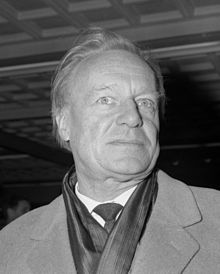André Cluytens
André Cluytens (pronunciation: [klɔjtɛns]) (born March 26, 1905 in Antwerp , † June 3, 1967 in Neuilly-sur-Seine ) was a Belgian-French conductor .
Live and act
Cluytens attended the Koninklijk Vlaams Muziekconservatorium in Antwerp at the age of nine , where he won a first prize in piano playing at the age of 16. After winning further prizes in harmony and composition at the age of 17 , he became choir conductor and répétiteur at the Bourlaschouwburg in Antwerp. In 1927 he became principal conductor there.
From 1932 Cluytens conducted mainly in France, at the Théâtre du Capitole de Toulouse , at the Opéra National de Lyon and at the Paris Opéra Comique , where he was chief conductor from 1946 to 1953. In 1945, Cluytens took French citizenship. His international career began in 1944 with his first conducting at the Paris Grand Opéra .
From 1949 to 1960, Cluytens was Charles Münch's successor as chief conductor of the Orchester de la Société des Concerts du Conservatoire Paris . Without giving up his privileged relationship with the Paris orchestra, Cluytens was chief conductor of the Orchester national de Belgique from 1958 until his death in 1967 , which he reorganized into the official capital of the capital orchestra . Cluytens has made guest appearances in Vienna, at La Scala in Milan , in Berlin, in the USA, Japan and Australia.
In 1955 Cluytens made his debut as a conductor at the Bayreuth Festival with Tannhäuser . In the following years he also conducted Lohengrin , the Mastersingers of Nuremberg and Parsifal .
André Cluytens was above all a specialist in French composers and premiered various works, such as Cantique de la Sagesse by Alexis Roland-Manuel (1891–1966), Trois danses rituelles by André Jolivet , Le Carosse du Saint-Sacrement by Henri Busser , Trois Talas by Olivier Messiaen , Bolivard by Darius Milhaud and compositions by Henry Barraud (1900–1997) and Florent Schmitt .
Cluytens also became known for his complete recording of the Beethoven symphonies with the Berlin Philharmonic . He was a guest conductor with many leading orchestras, such as the Berlin and Vienna Philharmonic Orchestra . He was also a regular guest at the Vienna State Opera .
Discography (selection)
- 1948: Jacques Offenbach , Les contes d'Hoffmann , choir and orchestra of the Opéra-Comique Paris, Columbia, mono
- 1950: Georges Bizet , Carmen , choir and orchestra of the Opéra-Comique Paris, Columbia, mono
- 1954: Georges Bizet , Les Pêcheurs de perles , choir and orchestra of the Opéra-Comique Paris, Columbia, mono
- 1958–1961: Ludwig van Beethoven , 9 symphonies, Berliner Philharmoniker, His Master's Voice, stereo
- 1959: Ludwig van Beethoven , violin concerto , David Oistrach , Orchester national de la Radiodiffusion française, Columbia, stereo
- 1962: Gabriel Fauré , Requiem , Orchester de la Société des Concerts du Conservatoire, His Master's Voice, stereo
- 1965: Jacques Offenbach , Les contes d'Hoffmann , Orchester de la Société des Concerts du Conservatoire, His Master's Voice, stereo
literature
- Michel Guiomar, translation: Marianne Damm: Cluytens, André , in: Die Musik in Geschichte und Gegenwart , Directmedia Berlin 2004 (CD-Rom edition) pp. 14.213–14.215, see also MGG vol. 15, 1973, p. 1521
- Anja Silja : The longing for the unattainable. Berlin 1999, ISBN 3-932-529-29-4
Web links
- André Cluytens at Discogs (English)
Individual evidence
- ↑ In a radio interview in the early 1960s, André Cluytens insisted on the Flemish pronunciation of his surname.
- ↑ a b c Michel Guiomar, in: MGG Volume 15, Col. 14.213.
- ↑ Michel Guiomar, in: MGG Volume 15, Col. 14.214.
| personal data | |
|---|---|
| SURNAME | Cluytens, André |
| BRIEF DESCRIPTION | Belgian-French conductor |
| DATE OF BIRTH | March 26, 1905 |
| PLACE OF BIRTH | Antwerp |
| DATE OF DEATH | 3rd June 1967 |
| Place of death | Neuilly-sur-Seine |
